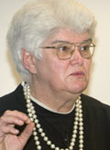Book recounts activism, struggles of U.S. women scientists
By Susan Kelley

For four decades, Cornell science historian Margaret Rossiter has been researching, writing and publishing on the history of women scientists in America. She started in 1972, when everyone assured her that there had never been any women scientists in the United States, or anywhere, she said.
"Not even Madame Curie counted. But the more I looked, the more I found," said Rossiter, the Marie Underhill Noll Professor of History of Science.
Rossiter has completed a trilogy on the topic, with her third book focusing on women scientists' most recent pioneering efforts and contributions. In "Women Scientists in America: Forging a New World Since 1972" (Johns Hopkins University Press), she guides us from the "rather quiet, mundane, even ladylike" emergence of female researchers' first interest groups to their later direct confrontations.
Central to this story are the struggles and successes of "clever, astute, hardworking and determined" women scientists in the era of affirmative action. Scores of previously isolated women scientists were suddenly energized to do things they had rarely, if ever, done before: form organizations and recruit new members, start rosters and projects, put out newsletters, confront authorities and even fight (and win) lawsuits. Rossiter follows the major activities of these groups in several fields -- from engineering to the physical, biological and social sciences -- and their campaigns to raise consciousness, see legislation enforced, lobby for passage of the Equal Rights Amendment and serve as watchdogs of the media.
The 528-page book also covers the changing employment picture in the federal government, academia, industry and the nonprofit sector and discusses contemporary battles to increase the number of women in the National Academy of Sciences and of women presidents of scientific societies.
Rossiter mined nearly 100 previously unexamined archival collections and more than 50 oral histories to write the book.
The previous books in her series are "Women Scientists in America: Struggles and Strategies to 1940" and "Women Scientists in America: Before Affirmative Action, 1940-72," also published by Johns Hopkins University Press. The former won an award for the best book by an American woman from the Berkshire Conference of Women Historians. The latter was the winner in 1997 of the History of Science Society's Pfizer Award for Outstanding Book in the History of Science.
Media Contact
Get Cornell news delivered right to your inbox.
Subscribe